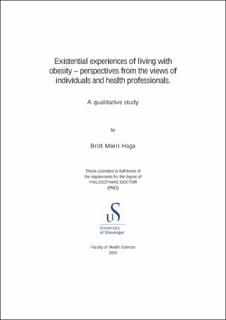| dc.contributor.advisor | Ueland, Venke | |
| dc.contributor.advisor | Furnes, Bodil | |
| dc.contributor.advisor | Dysvik, Elin | |
| dc.contributor.author | Haga, Britt Marit | |
| dc.date.accessioned | 2020-11-10T10:32:58Z | |
| dc.date.available | 2020-11-10T10:32:58Z | |
| dc.date.issued | 2020-11 | |
| dc.identifier.citation | Existential experiences of living with obesity – perspectives from the views of individuals and health professionals: A qualitative study by Britt Marit Hage, Stavanger : University of Stavanger, 2020 (PhD thesis UiS, no. 554) | en_US |
| dc.identifier.isbn | 978-82-7644-962-4 | |
| dc.identifier.issn | 1890-1387 | |
| dc.identifier.uri | https://hdl.handle.net/11250/2687079 | |
| dc.description.abstract | Background
Obesity is a serious health challenge around the world. It imposes great limitations upon everyday activities, evokes stigmatisation and discrimination and creates a sense of failure. For many of those affected, obesity and fluctuations in weight becomes a lifelong condition and may cause existential challenges. Today’s treatment approach to obesity seems to be dominated by biomedical ideas and thoughts. Thus, solutions to the obesity challenge is mainly sought for within the biomedical paradigm. Intertwined with socio-cultural norms and values, the explicit and implicit message that is conveyed to people with obesity, is that they should lose weight. Accordingly, health related research is dominated by research that focus on outcome and experiences related to different types of obesity treatment, aiming at finding a solution to how to treat obesity. However, neither research nor today’s treatment approach manage to capture the complexity and depth of life concerns of living with obesity. Health professionals have an important role in the treatment offered to people living with obesity. However, little is known about health professionals’ interpretations of existential experiences of people who are living with obesity. It is therefore important to conduct qualitative studies to understand more about the existential experiences in people with obesity, from their perspective and that of health professionals.
Aims
The overall aim of this doctoral thesis was to gain a deeper understanding of existential experiences of living with obesity, by exploring the perspectives of individuals and those of health professionals. The thesis comprised two substudies. The findings of Substudy A are presented in two papers. The aim of paper I was to gain deeper insight into existential experiences of people living with obesity. The aim of paper II was to gain deeper insight into how people living with obesity handle their life situation. The findings of Substudy B are presented in one paper. The aim of paper III was to gain deeper insight into existential experiences of people who are living with obesity, from the perspective of health professionals.
Methods
Substudy A consists of qualitative in-depth open-ended interviews with people living with obesity. A total of 21 men and women recruited from a residential camp and a Healthy Life Centre participated in the study. The interviews were followed by a three-step analytical process inspired by Ricoeur. Substudy B used focus group interviews with health professionals to complement our knowledge about existential experiences of people who are living with obesity. Three focus groups with 18 health professionals participated. The interviews were followed by analysis using three levels of interpretation of meaning, inspired by Brinkmann and Kvale.
Findings
The findings revealed existential experiences related to living with obesity. People living with obesity seem to face limitations in life because of their bodies, leading to feelings of having their life on hold. At the same time, they seem to struggle towards balance in life to make living bearable, despite their perceived limitations. These existential experiences make living with obesity ambiguous. The potential for wellbeing in the search for meaning and balance in existence and the life phenomena in constant fluctuation, make living with obesity movable. Health professionals seem to sense existential experiences in people living with obesity, but the meaning of the existential experiences might not be fully comprehended. However, nuances in the health professionals’ interpretations was revealed pointing towards ambiguity and movement. As such, the main findings of this thesis are that living with obesity seems to be ambiguous and movable. | en_US |
| dc.language.iso | eng | en_US |
| dc.publisher | University of Stavanger, Norway | en_US |
| dc.relation.ispartofseries | PhD thesis UiS; | |
| dc.relation.ispartofseries | ;554 | |
| dc.relation.haspart | Paper 1: Haga BM, Furnes B, Dysvik E, Ueland V (2019). Putting life on hold: lived experiences of people with obesity. Scandinavian Journal of Caring Sciences. 34(2). https://doi.org/10.1111/scs.12756 | en_US |
| dc.relation.haspart | Paper 2: Haga BM, Furnes B, Dysvik E, Ueland V (2019). Aspects of well-being when struggling with obesity. International Journal of Qualitative Studies on Health and Well-being. 14(1). https://doi.org/10.1080/17482631.2019.1699637 | en_US |
| dc.relation.haspart | Paper 3: Haga BM, Furnes B, Ueland V (2020). Existential experiences of people with obesity from the perspective of health professionals. Ready for submission. This paper is not included in Brage because it has not yet been published. | en_US |
| dc.rights | Copyright the author | |
| dc.subject | overvekt | en_US |
| dc.subject | sykelig overvekt | en_US |
| dc.subject | overweight | en_US |
| dc.subject | obesity | en_US |
| dc.title | Existential experiences of living with obesity – perspectives from the views of individuals and health professionals: A qualitative study. | en_US |
| dc.type | Doctoral thesis | en_US |
| dc.rights.holder | © 2020 Britt Marit Haga | en_US |
| dc.subject.nsi | VDP::Medisinske Fag: 700::Helsefag: 800::Samfunnsmedisin, sosialmedisin: 801 | en_US |
